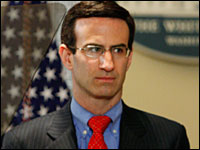Orszag discussed the 2010 budget at a meeting last week.

Some experts are saying similar ideas for reducing costs have been talked about for decades. But White House budget director Peter Orszag tells NPR’s Steve Inskeep that the industry cost-savings plan announced Monday is a big step toward overhauling the system.
“I have never seen the doctors’ association, the hospitals’ association, pharma and device manufacturers step forward and say, ‘We believe we can take costs out of the system. We believe we can bend the curve on long-term cost growth,’ ” Orszag says. “That is different.”
He adds: “I do view this as a significant step forward.”
After meeting with President Obama on Monday, the coalition of health industry stakeholders announced they would voluntarily make changes that would cut increases in projected health care costs by $2 trillion over the next decade.
Some of the cost-saving measures discussed by the coalition representatives involve computerizing medical records and coordinating care, but other initiatives are more controversial — including the use of comparative effectiveness research in patient care. Comparative effectiveness research shows which treatments are more effective.
Orszag said the coalition’s plan is significant, but he said the administration will continue to look to the industry to make good on their commitments.
“Yesterday was a significant step forward, but it is also the case that we need to move forward and start filling in more of the details,” he said.

